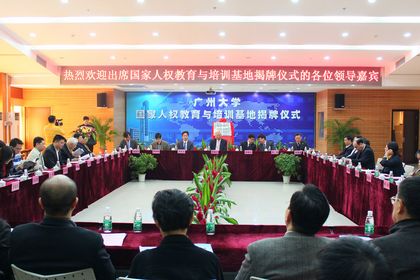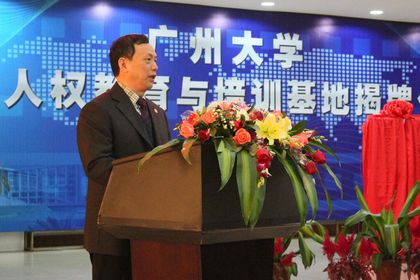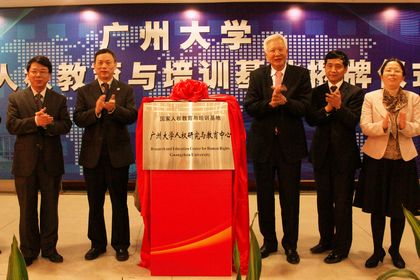Guangzhou University, Dec. 21, 2011:The inaugural ceremony of Guangzhou University National Education and Training Center of Human Rights was yesterday.
The ceremony was attended by provincial and municipal government officials, including Luo Haocai, Former Deputy Chairman of CPPCC and President of China Association of Human Rights Studies; Chen Zhengong, Deputy Director of the 17th Division of the State Council News Office and Deputy Secretary General of China Association of Human Rights Studies; Huang Zhaolong, Deputy Secretary General of Guangdong CPPCC; Jiang Bing, Deputy Director of Guangdong Propaganda Department; Li Huanxin, Deputy Director of Guangzhou NPC Law Committee; Zeng Weiyu, Deputy Director of Guangzhou Propaganda Department; Huang Shusheng, Deputy Inspector of Guangzhou Education Bureau. Presided by Xu Junzhong, Vice President of GU, the ceremony was also attended by Yu Jianshe, President of GU; Li Buyun, Director of Guangzhou University Human Rights Research Center; as well as members from the Center.

Jiang Bing, Deputy Director of Guangdong Propaganda Department, gave a speech on the inaugural ceremony and extended his gratitude to the National Education Bureau, National Propaganda Office and the China Association of Human Rights Studies for their full support to the research and education undertaking of human rights in Guangdong. He proposed his wish that the Education and Training Center could render more insight into the future development of human rights studies in the province and in the country as well.
Huang Shusheng, Deputy Inspector of Guangzhou Education Bureau, offered his warmest congratulations to Guangzhou University Human Rights Research Center for getting the approval to establish the National Education and Training Center of Human Rights. He believed that such an honor did not come by easily for GU, so it demonstrated the academic achievement of GU in human rights studies and the overall progress of the city of Guangzhou in cultural and arts science studies. And he also firmly believed that GU would continue to give full play to its resources in human rights studies and contribute to promote people’s awareness and knowledge of human rights.

Yu Jianshe, President of GU, thanked the attendants’ organizations and government agencies for their concern and support. He pledged that GU would seize this opportunity to enhance theoretical studies, education, training and promotion of human rights so that it could live up to the expectation from the country and its mission of academic advancement. He wished that the Center could continue to win the support from the attendants’ organizations and government agencies which helped to foster exchanges and cooperation of studying human rights.

Li Buyun, Director of Guangzhou University Human Rights Research Center, announced his commitment of working hard with his team to build the Center into “one of the best non-governmental organizations in China with great influence among the public and high recognition in the world.” His commitment also went to the protection and promotion of human rights undertaking in Guangzhou and in Guangdong as well.
Guangzhou University Human Rights Research Center was set up on April 11 this year as one of the three National Education and Training Centers of Human Rights approved by the National Ministry of Education. Early in 2007, the Center was chosen as the Provincial Key Research Center of Cultural and Arts Science Studies in Guangdong. Thus, GU is the only single university in China that is possessed of both provincial and national education and training centers of human rights and cultural and arts sciences. Since its establishment, the Center provided over 30 sections of training to over 2000 people in NPC, government agencies and NGOs.

Guangzhou University Human Rights Research Center has identified its missions as follows: provide human rights knowledge training to civil servants at different levels of government agencies in Guangdong and some of the neighboring provinces, as well as to people working at NGOs and state-owned organizations; offer lectures on human rights to students in some primary schools and middle schools as pilot program; offer lectures on human rights to undergraduate and postgraduate students in GU, and provide human rights majors for postgraduates; compile teaching materials and training manuals, and provide TOT programs; work with the media to promote and popularize human rights; offer consultant services on human rights; conduct national cooperation and exchanges to build a theoretical system with Chinese characteristics and raise the status of research in the international community.